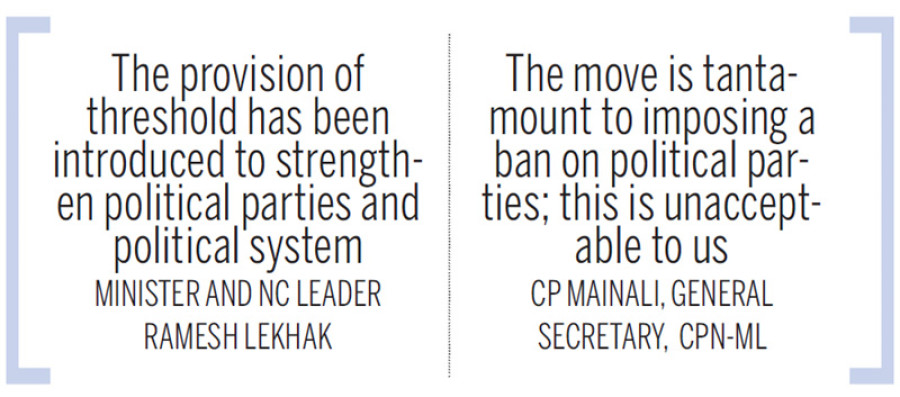National
Criteria for nat'l parties: 3 percent vote share, 1 FPTP seat a must
When national elections are held, before January 21 next year as per the constitutional deadline, political forces must secure at least one seat under the first-past-the-post system and three percent vote share under proportional representation system to earn the status of “national parties”, according to the Bill on Political Parties endorsed by Parliament on Wednesday.
Binod Ghimire
When national elections are held, before January 21 next year as per the constitutional deadline, political forces must secure at least one seat under the first-past-the-post system and three percent vote share under proportional representation system to earn the status of “national parties”, according to the Bill on Political Parties endorsed by Parliament on Wednesday.
The bill was stuck at the State Affairs Committee (SAC) of Parliament since December 24 due to lack of consensus among major parties and objection from fringe forces.
Parliament on Wednesday endorsed the bill after three major parties arrived at consensus to keep three percent threshold and one FPTP seat, a condition fringe forces have objected to saying it would deprive them of their representation.
A sub-committee under SAC on Wednesday morning agreed on three percent threshold, which was later endorsed by the full committee before it was tabled in the House. The House meeting called for 3pm was postponed by around two hours due to reservations from lawmakers from majority of the parties in the House.
Nineteen fringe parties boycotted Wednesday’s House meeting in protest of the provision. They claimed that major parties “have formed a syndicate and taken the norms of democracy to hostage”.
Speaker Onasari Gharti, however, decided to proceed with the House meeting.
President Bidya Devi Bhandari will soon sign the bill into law which will be applicable from the federal elections.
Parties failing to meet the condition of three percent threshold and one seat under FPTP, however, will have their representation in Parliament but their leaders will be given the status of “independent lawmakers”, according to the bill.
Going by the new provision, at present, out of 31 parties represented in Parliament, only four—Nepali Congress, CPN-UML, CPN (Maoist Centre) and Rastriya Prajatantra Party (RPP)—meet the criteria. The RPP meets the condition because of the merger of two RPPs in November last year.
While presenting the bill in Parliament for endorsement, Minister for Physical Infrastructure and Transport Ramesh Lekhak said that the provision of threshold was introduced “to strengthen political parties and political system”.
Fringe parties in Parliament said in objection that the provision “is against the constitutional provision that allows formation of parties”. “This is tantamount to imposing a ban on political parties and this is unacceptable to us,” said CP Mainali, general secretary of the CPN-ML, which is the tenth largest party in Parliament.
The new law will mean parties not sure of meeting the threshold criteria could form an alliance and fight under a single electoral symbol to improve their chances in elections.
With the endorsement of the Bill on Political Parties, five out of nine election related laws needed to hold three levels of elections have been approved so far.




 8.67°C Kathmandu
8.67°C Kathmandu















